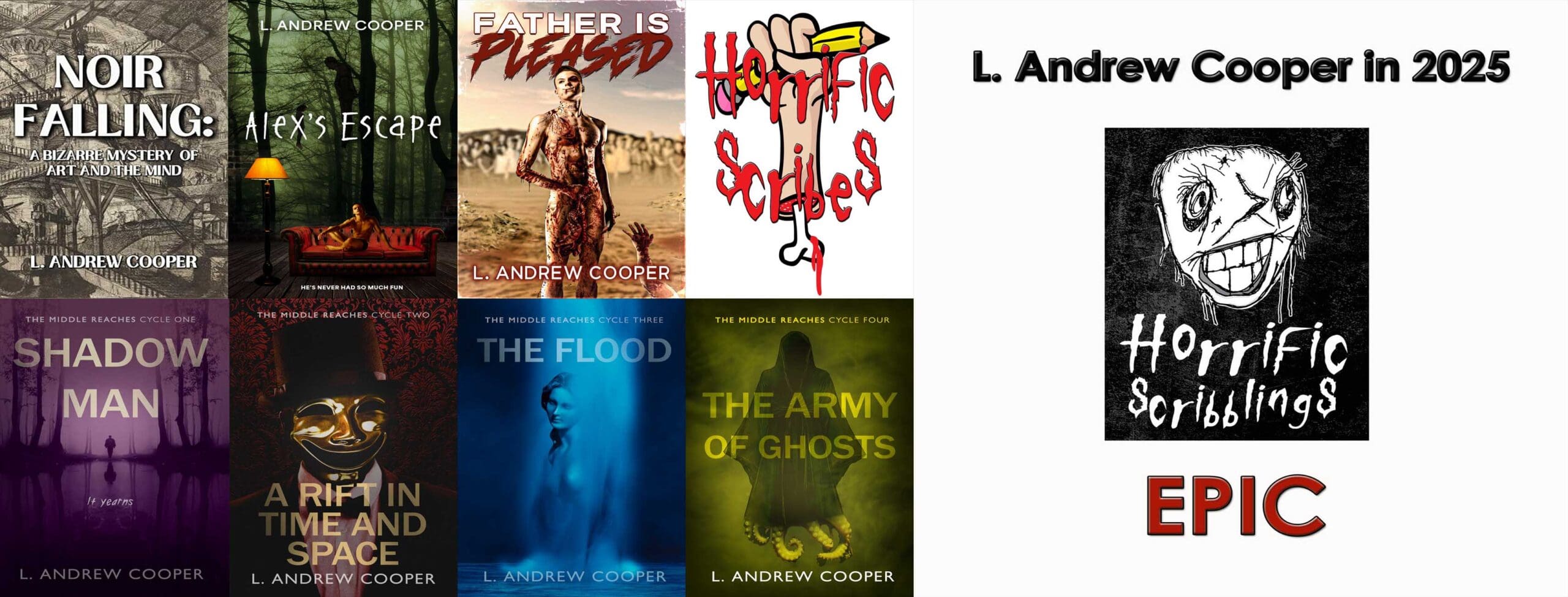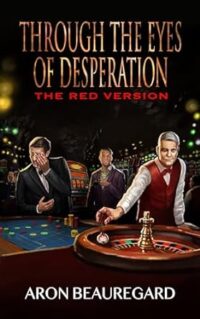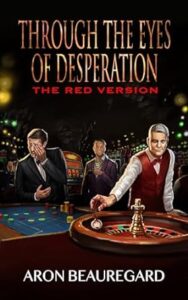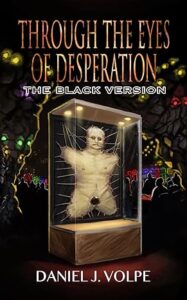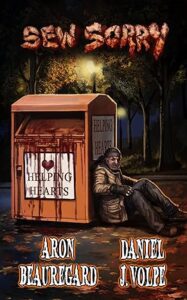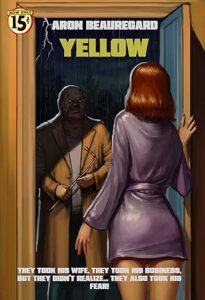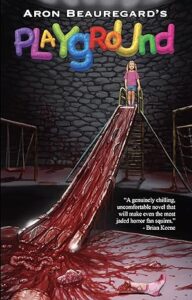Two-time winner of the Splatterpunk Award Aron Beauregard shares insights about his recent book Through the Eyes of Desperation, The Red Version and teases us a bit about dark treats to come.
Through the Eyes of Desperation, The Red Version
ALL BETS ARE OFF
Red has tried to keep his nose clean, but the sins of his past still haunt him. They’ve forced him back into the darkness—toward a life he’d hoped to leave behind. Now he has just four days to make things right.
The scam seemed safe enough at first, but now Red is six figures in debt, and there’s more than just money at stake. There’s making things right with the daughter he turned his back on. There’s greasing the palms of the disturbed criminals holding his geriatric mother as collateral. There’s being able to face himself in the mirror.
Everyone in the city’s underbelly knows there’s only one way to obtain such a large sum on short notice…
Shadows is an underground casino where nightmares are born and dreams go to die. Where humiliation, drugs, and violence are as much a part of the games as cards and dice. When Red enters a world where money isn’t the most coveted prize, will he earn enough to solve his problems, or suffer the ultimate loss?
This volume contains 17 interior illustrations.
WARNING: This book contains graphic content. Reader discretion is advised.
The Interview
1. A Desperate Universe. Through the Eyes of Desperation, The Red Version has a companion novel, Through the Eyes of Desperation, The Black Version, by Daniel J. Volpe, as well as a related book that you and Volpe co-authored, Sew Sorry. How did this unusual collaboration come to be? What was your process? Should readers approach the different pieces of this universe in a particular order? If so, what is it, and if not, why not? Do you expect this universe to keep growing? Why or why not?
AB: The process was fun, but a lot of work. We went on a writer’s retreat in this cabin in upstate NY. Over the course of a few days, we fleshed out the story of Shadows casino as well as some of the characters inside, but it still took us nearly a year afterward to release the books. We had to edit each other’s books, expand, deduct, and then have another person edit both books before we were able to release them. It was truly an exhaustive process since the books have quite a bit of connective tissue. Despite being connected, all the books also serve as stand-alone works. You can read any single title and not touch any of the others, and you should get a satisfying read. But for the best reading experience, I do suggest checking them all out. There is no particular order in which they need to be read. Will the universe expand? Anything’s possible if enough people read and enjoy the stories!
2. A Criminal Universe. Some of your closing words refer to the “city of violence” in which your tale has taken place, and indeed, the major settings you use are mostly rundown buildings, dirty streets, and a casino splattered with gore, places populated with mobsters and junkies who seem to be in the clutches of a pandemic sociopathy. Are you reflecting on particular times or places? Shadows, the casino, is likened to Hell—have you created a hellscape or a world closer to, and critical of, our own? Your world’s seedy atmosphere evokes older pulp fiction and hints at noir—how do those traditions relate to your take on hardcore horror?
AB: I enjoy the pulp and noir times. Technology tends to ruin horror sometimes, in my humble opinion. Many of my books tend to take place in the 90s. With Through the Eyes of Desperation I wanted to build a city of violence, sort of like I did in my other Splatterpulp book Yellow. Not exactly the same, of course: each place has its own shades of sadness and degeneracy. But I enjoy having a nameless city in some of my stories. I think it’s far more interesting than reality.
3. Money, Power, and Sadism. Speaking of seeing the world through critical eyes, at one point Red reflects, “If you have less, you are less—at least under this regime.” In the world of Shadows, anybody could get hacked to pieces, but you’re much more likely to meet a grisly fate if you don’t have money. To what extent, if at all, does this world of high-stakes gambling reflect on investment capitalism? I’ve branded a lot of your characters as sociopaths: many are sadists as well. Is a regime under which having less makes you less a sadistic regime? Why or why not?
AB: It’s more just a simple statement about how many people—but not all—in the world view self-worth. One’s importance, success, and overall impact is heavily tied to finance. In the world of Shadows, one of the regime’s founding principles was to allow those without such backing to have a chance at changing their lives. But such a chance comes with the greatest risk of all.
4. Anxiety and Desperation. What Red suffers through in this novel is enough to make anybody anxious (to say the least), but from the beginning, his perspective calls attention to his anxiety as if it might be out of the ordinary. Do you think the novel suggests Red has an anxiety disorder or other underlying condition that propels him psychologically, or are his reactions to situations generally proportionate to how fucked up they are? How would you describe Red’s psychological make-up? He’s motivated by his daughter, his mother, being able to face himself… but, bottom line, what really drives his behavior?
AB: I wasn’t really imagining him having any kind of disorder. Red’s just kind of rolling with the circumstances of his life and doing his best to tread water. Without giving too much away, I think he’s probably driven mostly by guilt.
5. Addiction and Other Pastimes. Red knows himself well enough to know that at one point he gave up a heroin addiction for a gambling addiction, and his addictions—as well as other characters’ addictions in the novel—tend to get him into a lot of trouble. At the same time, the availability of hard drugs inside Shadows appears sometimes to be a blessing. What position or positions, critical or otherwise, does your novel take on gambling and other addictions? The next time I go to Vegas, I will undoubtedly think about your book and feel a little queasy. Do you mean to associate more mundane casinos and recreational substance use with extreme horrors? Why or why not?
AB: When I write books, most of the time I’m not trying to take a position, I’m just trying to tell a story. I think that’s where some writers get it wrong, and the work can come off as preachy. Does gambling—or any addiction for that matter—have its pitfalls? Of course. But there’s a big difference between five guys getting together and playing a friendly game for a $100 pot and the guy drinking by himself who spends every paycheck at the tables. For some folks gambling is fine; for others, it unravels their entire lives. It was the latter for Red.
6. Escalation and Desensitization. While escalating violence and gore are features of much hardcore horror, Through the Eyes of Desperation, especially in later chapters, uses locations like levels in a video game (or layers of Hell), each at least threatening something ghastlier than the last. How conscious were you about making escalating violence a matter of structure, and did you think of video games or other similar types of storytelling? How difficult is one-upping your last gruesome scene? As Red advances, he thinks about the violence having less of an impact on him. Do you think his position reflects the reader’s? Why or why not?
AB: The three layers at the end are symbolic. Many of Red’s problems began after a three-game parlay, so it was only fitting. It is certainly difficult to build such depravity, but it’s also fun. I dive pretty deep into my imagination to conjure such things. This one didn’t have any video game inspiration, but my other book Playground did. I don’t think I’m prepared to paint all readers with one broad stroke. Each person is an individual and will have unique feeling about the impact.
7. Luck, Chance, and Choice. Given that Shadows is a casino, I don’t think I’m spoiling anything by saying that a lot of gambling drives the plot. Themes related to luck, chance, and choice seem natural, and you develop them well. Does luck actually exist in this novel’s world? Why or why not? Are the chances ever fair? Choice might be the biggest issue: Red thinks more than once that he has come to the point where he is through no choice of his own. Does your novel stage a battle between free will and determinism, or the idea that outside forces determine what we do?
AB: These are all interesting and deep questions but, simply put, Red’s luck is kind of in the readers’ hands. Those who decide to read the book will understand once they get to the chapter titled “The Gamble.”
8. Human Experiments, Writing Experiments. One of the biggest questions driving your story seems to be, How far will a truly desperate person go? For example, how far will Red go to make things right with his daughter and save his mother from the consequences of his debt? Shadows seems like an experiment to test out the answers to that question, seeing how far, how very, very far, desperate people will go. Do you agree with this view of your novel as an exercise in human experimentation? Why or why not? On top of that, the novel, though highly readable, is a little experimental, jumping around in time in a way the increases escalating tension and ending with a formal coup I won’t reveal. Are you experimenting on your audience?
AB: I think I’m experimenting with my readers somewhat. In breaking the 4th wall for one since it’s the first time I’ve ever done that. But that won’t be where my experimentation stops. I have other ideas that are far stranger than this coming soon! But I truly hope the readers enjoyed this.
9. Future Visions? I try not to ask standard questions too often, but since you seem fairly prolific, I really am wondering—what can you tell us about works in development and in mind for the future?
AB: Please stay tuned! While I can’t reveal much at this moment, I will say that two of my most creative works are going to be released in 2024/2025. I wish I could give more detail, but I promise, when you hear about these projects, you’ll know exactly what I’m referring to.
10. Access! How can readers learn more about you and your works (please provide any links you want to share)?
AB:
Signed books: ABHorror.com
Audible: Audiobooks
Amazon: eBooks
Facebook: Aron Beauregard
Instagram: AronBeauregardHorror
Twitter: AronHorror
TikTok: @AronBeauregardHorror
Newsletter: Subscribe
About the Author
Aron Beauregard was born and raised in Central Falls, Rhode Island. He’s been writing horror since the 6th grade and has now released over 20 books. An avid supporter of horror art and illustration, Aron has made it his standard to hire illustrators for every book that he puts out himself under his brand AB Horror.
His writing is dark and without boundaries and, as a result, he’s won the Splatterpunk Award twice after garnering 4 total nominations.
To get the latest updates about upcoming releases, signed books and merchandise, film news, his horror podcasts, and so much more, visit his website:
To subscribe to his free newsletter, join the AB Horror Maggot Mailing List at:
https://aronbeauregard.substack.com
